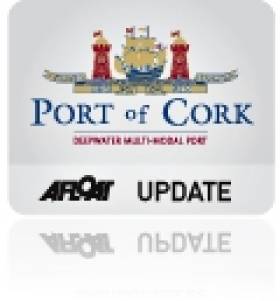Displaying items by tag: Maersk Novanville
The 'Banana' Trade Returns to Cork
#PORT OF CORK – Global shipping giant Maersk Line recently started their first ever direct service to Ireland with a new liner service calling to the Port of Cork and sees the return of the 'banana' trade not last seen in port since the 1970's, writes Jehan Ashmore.
The older 'banana' boats or reefers that used to serve Cork may be long gone but the Danish owned Maersk Line will be operating an impressive pool of eight large contiainerships. They will bring leading banana brands from Central American ports to Europe with Cork being the first port of call in Europe. The liner service starts in the Mexican port of Vera Cruz and includes calls to Costa Rica, Belize, Panama before reaching Cork.
One of the vessels Maersk Nolanville (2004/26,833grt) last week docked in Ringaskiddy Deepwater Terminal, is one of the largest of her type to be accommodated in the port. At 700m long, a beam over 30m and drawing a draft exceeding 10m the South Korean built vessel was too large to berth at the ports Tivoli Container Terminal further upriver on the Lee.
Maersk Nolanville and her fleet-mates will operate with a weekly call to Cork on Thursdays, where quayside cranes in Ringaskiddy will handle the 2,500 (TEU) capacity vessels including around 800 refrigerated containers containing perishable tropical fruits.
Asides bananas the vessels will import other cargoes, with the containerships also calling to Tilbury in the UK and Rotterdam and with exports on the return leg of the long trans-Atlantic voyage home.
























































